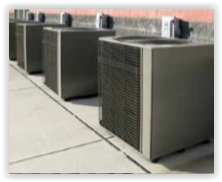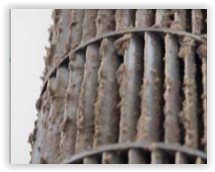The Accidental Terrarium
IS YOUR AHU HIDING UNDISCOVERED LIFE?
 When a tenant starts to complain about the indoor air quality of a building, the first thing your IAQ expert will do is examine the air handler units (AHU) in the complaint area. It’s easy to mistake an AHU as clean as a whistle based on outward appearances, but inside the AHU, an entire ecosystem can thrive. There are a number of factors that can result in a colorful and fuzzy environment within your AHU — and such an environment can lead to contaminants causing problems with the local air quality.
When a tenant starts to complain about the indoor air quality of a building, the first thing your IAQ expert will do is examine the air handler units (AHU) in the complaint area. It’s easy to mistake an AHU as clean as a whistle based on outward appearances, but inside the AHU, an entire ecosystem can thrive. There are a number of factors that can result in a colorful and fuzzy environment within your AHU — and such an environment can lead to contaminants causing problems with the local air quality.
Here are some components your maintenance team needs to look at when cleaning your AHU.
Fan assembly — The fan housing tends to be cleaned regularly, but the fan blades? Not so much. Dirty blades can be the source of excess particles in the indoor air.
Coil surface — When dust and dirt make it past the filter system, they can become impacted on the coil. This results in bacteria, which manifests as a black or slimy discoloration on the surface of the coil. Needless to say, this shouldn’t be present.
Drain pans — It’s important to check that an AHU’s condensate drain pans are actually draining properly. When water is allowed to sit in one spot, it stagnates, leading to bacterial growth. Flushing out drain pans regularly and applying antimicrobial tablets can prevent this.
 Internal insulation — Insulation near the coil is a serious concern. When water is thrown off the coil, this insulation can become wet, making it a prime habitat for mold to grow freely. When cleaning an AHU, maintenance should always check for discoloration and evidence of moisture on the internal insulation surface.
Internal insulation — Insulation near the coil is a serious concern. When water is thrown off the coil, this insulation can become wet, making it a prime habitat for mold to grow freely. When cleaning an AHU, maintenance should always check for discoloration and evidence of moisture on the internal insulation surface.
These are not the only ways an unclean AHU can negatively affect your building’s IAQ, but they are the most common. Instructing your team to practice regular maintenance of AHUs by turning off the unit and opening access doors is important for maintaining IAQ. With proper maintenance, many concerns can be prevented, and you can ensure your AHU is not the source of IAQ problems should tenants start to complain.
